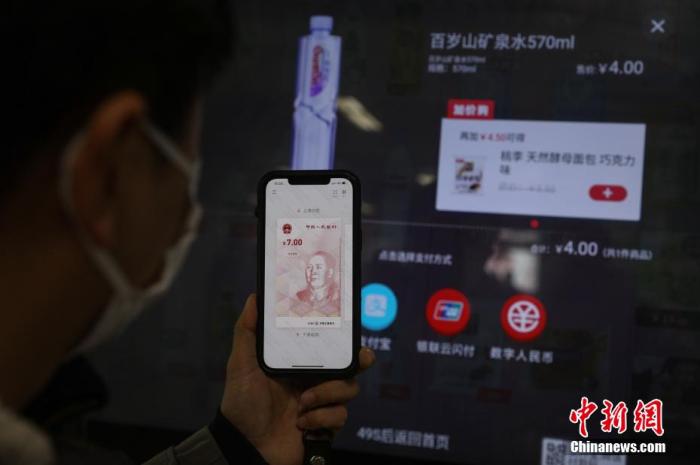Will physical currency and electronic payment be replaced? China's central bank explains the digital renminbi
China News Service, Beijing, July 16th, title: Will physical currency and electronic payment be replaced?
China's central bank explains the digital renminbi
China News Agency reporter Wang Enbo
On the 16th, the People's Bank of China announced the "White Paper on China's Digital RMB R&D Progress", which was the first to systematically disclose the development of digital RMB.
At the briefing held that day, Fan Yifei, vice governor of the People's Bank of China, and other officials responded in detail to a series of questions about the digital renminbi.
Data map: Digital RMB payment.
Photo by Zhang Hengwei
-Will it replace the physical renminbi?
Luo Rui, director of the Central Bank’s Monetary and Banking Bureau, said that the digital renminbi is mainly positioned as a cash payment voucher (M0), and the physical renminbi are both the central bank’s liabilities to the public and have the same legal status and economic value.
The "People's Bank of China Law (Revised Draft for Solicitation of Comments)" that has been promulgated so far further clarifies that "RMB includes physical and digital forms."
From the perspective of economic value, the digital renminbi is equivalent to the physical renminbi and has basic functions such as currency value scale, transaction medium, and value storage.
The digital renminbi will be issued in parallel with the physical renminbi, and the People's Bank of China will make statistics, collaborative analysis, and overall management of the two.
Luo Rui said that as a country with a vast territory, a large population, multi-ethnic integration, and regional development differences, China's social environment, residents' payment habits, age structure, and safety requirements determine that the physical renminbi has the irreplaceable characteristics of other payment methods. .
The physical renminbi will coexist with the digital renminbi for a long time.
——Do you use blockchain technology?
Mu Changchun, director of the Central Bank's Digital Currency Research Institute, pointed out that blockchain has the advantages of non-tampering and traceability of data, but it has shortcomings in performance and scalability. It is more suitable for low concurrency and low sensitivity asset confirmation and transaction transfer. , Ledger verification and other scenarios.
According to the characteristics and scope of application of blockchain technology, the People's Bank of China has explored innovative applications of blockchain in trade finance, rights confirmation transactions, transaction reconciliation and other fields, such as trade finance blockchain platform and digital bill trading platform.
He emphasized that in accordance with the top-level design requirements of the digital renminbi, the technical route design needs to be based on the principles of long-term technological evolution, practicality and efficiency.
One is to meet the requirements of high retail concurrency and centralized management by the central bank, and a centralized approach should be adopted at the transaction level; the second is to promote fair competition and improve the efficiency of supervision; the third is to improve the efficiency of clearing and reconciliation, and realize "payment is settlement." "And efficient error handling; the fourth is to meet the anti-money laundering requirements while protecting privacy.
——Is security and privacy guaranteed?
In terms of security, Fan Yifei introduced that the central bank has standardized the design, development, and operation and maintenance of digital renminbi and related systems for the entire life cycle of information security management, to achieve non-repetitive spending, non-illegal copying and forgery, non-tampering and non-repudiation of transactions, etc. Features, a multi-level security protection system has been initially established to ensure that the digital RMB operating system meets the requirements of high security, high availability, high scalability, high concurrency, high ease of use and business continuity.
In terms of privacy, the digital renminbi system follows the principle of "small amount anonymous, large amount traceable according to law", fully considers the business risk characteristics and information processing logic under the existing electronic payment system, and meets the public's demand for small amount anonymous payment services.
Fan Yifei introduced that the digital RMB system to collect transaction information follows the principle of "minimum and necessary", does not collect excessively, and does not provide it to third parties or other government departments unless it is clearly stipulated by laws and regulations.
——What are the similarities and differences with electronic payment tools?
Mu Changchun said that the digital renminbi and general electronic payment tools are in different dimensions, complementary and different.
The digital renminbi will provide the public with a new universal payment method that can increase the diversity of payment tools and help improve the efficiency and security of the payment system.
Based on the M0 positioning, the digital renminbi is mainly used for retail payments, with the aim of improving the level of financial inclusion, drawing on electronic payment technology and experience and forming a useful supplement to it.
Although the payment functions are similar, the digital renminbi also has its specific advantages.
Mu Changchun pointed out that one is that the digital renminbi is the country’s legal tender and is the asset with the highest level of security; the other is that the digital renminbi has value characteristics that can transfer value without relying on bank accounts, and supports offline transactions. "Settlement" features; third, the digital RMB supports controllable anonymity, which is conducive to protecting personal privacy and user information security.
He emphasized that, like the relationship with the physical renminbi, the digital renminbi will coexist with traditional electronic payment tools for a long time.
(Finish)

